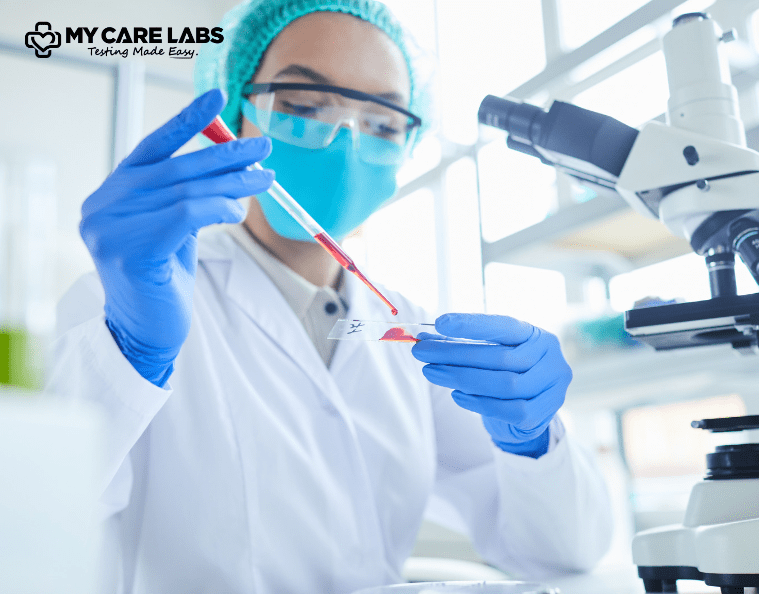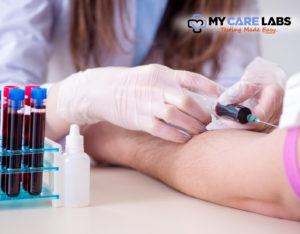I. Introduction to Hormone Tests
- Hormone Test is a diagnostic procedure used to measure the levels of various hormones in the body.
- Hormones are chemical messengers that regulate essential functions such as metabolism, growth, reproduction, and mood.
- The Importance of Hormone Testing in Healthcare cannot be understated, as it helps identify hormonal imbalances and associated health issues.
- Hormone Testing plays a crucial role in diagnosing and managing conditions such as thyroid disorders, reproductive disorders, and adrenal dysfunction.
- The Significance of Hormone Balance for Overall Health is evident in its impact on physical, mental, and emotional well-being.
- Hormone imbalances can lead to a range of symptoms and health problems, including fatigue, weight changes, mood swings, and fertility issues.
- Hormone Test involves collecting blood, urine, or saliva samples to analyze hormone levels.
- It helps healthcare providers assess hormone production, function, and regulation in the body.
- Hormone Testing is essential for identifying hormonal deficiencies, excesses, or dysregulation that may require intervention.
II. Understanding Hormones
A. Basics of Hormones and Endocrine System
- Hormones are chemical messengers produced by endocrine glands and released into the bloodstream to regulate various body functions.
- The endocrine system includes glands such as the pituitary, thyroid, adrenal, pancreas, and reproductive organs, which secrete hormones.
- Hormones act on target cells or organs, influencing processes like metabolism, growth, development, reproduction, mood, and immune response.
B. Types of Hormones
- Steroid Hormones: Derived from cholesterol, examples include testosterone, estrogen, and cortisol. They affect reproductive functions, stress response, and metabolism.
- Peptide Hormones: Composed of amino acids, examples include insulin, growth hormone, and oxytocin. They regulate growth, energy balance, and organ function.
- Amino Acid-Derived Hormones: Derived from amino acids like tyrosine, examples include thyroid hormones (T3 and T4) and catecholamines (epinephrine, norepinephrine). They regulate metabolism, heart rate, and mood.
C. Role of Hormones in Regulation of Body Functions
- Hormones play a crucial role in maintaining homeostasis and balancing internal conditions for optimal functioning.
- They regulate metabolism, energy production, nutrient absorption, blood glucose levels, and body temperature.
- Hormones also control growth, development, reproduction, menstrual cycles, sexual characteristics, and emotional responses.
III. Common Hormone test
A. Blood Tests for Hormone Levels
- Hormone Test for Women: Measures estrogen, progesterone, and follicle-stimulating hormone (FSH) levels to assess menstrual cycle, fertility, and menopause.
- Hormone Blood Test TSH: Measures thyroid-stimulating hormone (TSH) levels to evaluate thyroid function and detect thyroid disorders like hypothyroidism and hyperthyroidism.
- Hormone Blood Test Cortisol: Measures cortisol levels to assess adrenal function, stress response, and adrenal gland disorders.
B. Urine Tests for Hormone Metabolites
- Hormone urine tests assess hormone metabolites excreted in urine, providing insights into hormone production, metabolism, and elimination.
- These tests are used to evaluate hormone levels over time, monitor hormone therapy, and diagnose hormonal imbalances.
C. Saliva Tests for Hormone Levels
- Saliva hormone tests measure free hormone levels in saliva samples, reflecting active hormone concentrations in the body.
- They are used to assess hormone fluctuations, adrenal function, and hormone-related conditions like adrenal fatigue and hormone-dependent cancers.
D. Imaging Studies for Hormone-Producing Organs
- Ultrasound, MRI, and CT scans are used to visualize hormone-producing organs like the thyroid, adrenal glands, ovaries, and testes.
- These imaging studies help identify structural abnormalities, tumors, cysts, and other conditions affecting hormone production and function.
E. Stimulation and Suppression Tests
- Stimulation tests involve administering a substance to stimulate hormone production, followed by blood tests to measure hormone response.
- Suppression tests involve administering a substance to suppress hormone production, followed by blood tests to assess hormone suppression levels.
- These tests help evaluate hormone function, identify hormone deficiencies or excesses, and diagnose endocrine disorders.
IV. Indications for Hormone Testing
A. Symptoms and Conditions Requiring Hormone Evaluation
- Hormone Test for Women is often recommended for assessing hormonal imbalances associated with menopause, characterized by symptoms like hot flashes, night sweats, mood swings, and vaginal dryness.
- Hormone Test TSH is crucial for diagnosing thyroid disorders, including hypothyroidism (low thyroid function) and hyperthyroidism (overactive thyroid), which can cause fatigue, weight changes, hair loss, and temperature sensitivity.
- A hormone Blood Test may be necessary to evaluate adrenal disorders such as Addison’s disease (adrenal insufficiency) or Cushing’s syndrome (excess cortisol production), manifesting as fatigue, muscle weakness, mood changes, and skin abnormalities.
B. Monitoring Hormone Therapy
- Hormone Test for Women undergoing hormone replacement therapy (HRT) helps monitor hormone levels to ensure optimal dosage and effectiveness in managing menopausal symptoms.
- A hormone Blood Test is also essential for monitoring hormone therapy in fertility treatments, ensuring hormonal balance for successful conception and pregnancy.
C. Evaluation of Endocrine Disorders
- Hormone Test TSH is a key component in evaluating thyroid disorders such as hyperthyroidism (elevated TSH levels) and hypothyroidism (low TSH levels).
- Hormone Blood Test aids in diagnosing and managing endocrine disorders like Cushing’s syndrome (elevated cortisol levels) and Addison’s disease (low cortisol levels), guiding treatment strategies and monitoring disease progression.
V. Importance of Hormone Balance
A. Effects of Hormone Imbalance on Health and Well-being
- Hormone Test TSH is essential for assessing thyroid function and detecting hormone imbalances that can impact metabolism, energy levels, and overall well-being.
- Hormone Blood Test for women evaluates estrogen, progesterone, and testosterone levels, identifying imbalances linked to mood swings, fatigue, weight changes, and reproductive health issues.
B. Hormone Balance and Reproductive Health
- Hormone Test for Women plays a crucial role in evaluating reproductive hormone levels, supporting fertility assessments, and guiding hormonal interventions for infertility or menopausal symptoms.
- Hormone Blood Test also aids in assessing hormone balance during pregnancy, ensuring maternal and fetal health.
C. Impact of Hormones on Metabolism, Mood, and Energy Levels
- Hormone Test TSH helps assess thyroid function and its influence on metabolism, energy levels, body weight, and temperature regulation.
- Hormone Blood Test for women monitors hormone levels that affect mood, emotional well-being, cognitive function, and overall quality of life.
VI. Hormone Testing Technologies
A. Laboratory Techniques for Hormone Analysis
- Immunoassays: Immunoassays are commonly used laboratory techniques for hormone analysis, utilizing antibodies to detect and quantify specific hormones like TSH (Thyroid-Stimulating Hormone).
- Chromatography: Chromatography techniques, including gas chromatography (GC) and liquid chromatography (LC), separate hormone molecules for precise measurement in hormone blood tests.
- Mass Spectrometry: Mass spectrometry enhances hormone testing accuracy by analyzing the molecular mass of hormones, allowing for the quantification of hormone levels with high sensitivity.
B. Point-of-Care Hormone Testing Devices
- Point-of-care hormone testing devices provide rapid results at the patient’s bedside or in clinical settings, allowing for immediate assessment of hormone levels, especially in emergency situations.
- These devices are particularly useful for hormone test such as TSH (Thyroid-Stimulating Hormone) for thyroid function evaluation and hormone test for women during pregnancy monitoring.
C. Advances in Hormone Testing Accuracy and Sensitivity
- Technological advancements have led to improved accuracy and sensitivity in hormone testing, ensuring precise measurement of hormone levels in blood samples.
- Enhanced assays and instrumentation have reduced the margin of error in hormone testing, leading to more reliable results for healthcare providers and patients.
VII. Interpretation of Hormone Test Results
A. Normal Reference Ranges for Hormone Levels
- Hormone test results are interpreted based on established normal reference ranges specific to each hormone, such as TSH (Thyroid-Stimulating Hormone) for thyroid function assessment.
- Deviations from these reference ranges may indicate hormonal imbalances that require further evaluation and management.
B. Factors Affecting Hormone Levels
- Age: Hormone levels can vary with age, with certain hormones like estrogen and testosterone declining as individuals age.
- Gender: Hormone levels differ between genders, with women undergoing hormonal fluctuations during menstrual cycles, pregnancy, and menopause.
- Pregnancy: Hormone test for women during pregnancy monitor hormone levels crucial for fetal development and maternal health.
- Menstrual Cycle Phase: Hormone levels fluctuate throughout the menstrual cycle, impacting fertility, mood, and overall well-being.
C. Clinical Significance of Abnormal Hormone Levels
- Abnormal hormone levels, such as elevated TSH levels in hormone blood tests, may indicate conditions like hypothyroidism.
- Hormonal imbalances can contribute to various health issues, including infertility, mood disorders, metabolic disorders, and reproductive disorders.
- Clinical interpretation of hormone test results guides healthcare providers in diagnosing hormonal disorders, developing treatment plans, and monitoring patient progress.
VIII. Hormone Testing in Clinical Practice
A. Role of Healthcare Providers in Hormone Testing and Interpretation
- Healthcare providers play a crucial role in ordering and interpreting Hormone test, such as hormone test TSH (Thyroid Stimulating Hormone), hormone test for women, and hormone blood test.
- They assess patients’ symptoms, medical history, and risk factors to determine the need for Hormone Testing and select appropriate tests.
- Healthcare providers interpret Hormone Test results in the context of individual patient profiles, considering age, gender, hormonal fluctuations, and health conditions.
- They use Hormone Testing to diagnose hormonal imbalances, monitor treatment responses, and adjust hormone therapies as needed.
B. Integrative Approaches to Hormone Testing and Treatment (Functional Medicine, Holistic Care)
- Integrative healthcare approaches, such as Functional Medicine and Holistic Care, emphasize a comprehensive assessment of hormonal health through Hormone Testing.
- Functional Medicine practitioners use advanced Hormone test, including hormone test TSH, hormone test for women, and hormone blood test, to evaluate hormone levels and patterns.
- Holistic Care providers consider the interconnectedness of hormones, lifestyle factors, nutrition, and environmental influences in Hormone Testing and treatment plans.
- Integrative approaches to Hormone Testing and treatment aim to address root causes, promote hormone balance, and improve overall health outcomes.
C. Patient Education and Counseling on Hormone Health
- Healthcare providers play a vital role in educating and counseling patients on Hormone Health before and after Hormone Testing.
- They explain the purpose of Hormone Testing, potential hormone imbalances, and the impact on health and well-being.
- Healthcare providers discuss Hormone Test results with patients, explaining normal reference ranges, abnormalities, and implications for treatment.
- Patient education includes lifestyle recommendations, hormone therapies, and follow-up monitoring to optimize hormone balance and health.
IX. Hormone Testing for Special Populations
A. Hormone Testing in Pediatrics and Adolescents
- Hormone Testing in pediatric and adolescent populations includes hormone test TSH, hormone test for women (including puberty-related hormones), and hormone blood test for growth and development assessments.
- Healthcare providers use Hormone Testing to diagnose endocrine disorders, delayed puberty, precocious puberty, and hormonal imbalances in young patients.
- Hormone Testing in this population helps guide treatment decisions, monitor hormone therapies, and promote healthy growth and development.
B. Hormone Testing in Geriatric Patients
- Hormone Testing in geriatric patients involves assessing hormone levels related to aging, such as hormone test TSH, hormone test for women (menopausal hormones), and hormone blood test for adrenal function.
- Healthcare providers use Hormone Testing to evaluate hormone deficiencies, menopausal symptoms, osteoporosis risk, and age-related hormonal changes.
- Hormone Testing in geriatric patients guides hormone replacement therapies, lifestyle interventions, and preventive care measures for optimal aging.
C. Hormone Testing in Athletes and Fitness Enthusiasts
- Hormone Testing in athletes and fitness enthusiasts includes hormone test TSH, hormone test for women (including menstrual cycle hormones), and hormone blood test for testosterone levels.
- Healthcare providers use Hormone Testing to assess hormonal responses to exercise, training stress, and performance goals in athletes.
- Hormone Testing in this population helps identify hormonal imbalances, overtraining syndrome, and hormonal adaptations to exercise.
- Healthcare providers optimize Hormone Testing protocols for athletes, considering training phases, recovery periods, and performance outcomes.
X. Hormone Testing and Disease Prevention
A. Early Detection of Hormonal Imbalances and Associated Risks
- Hormone Test TSH, or Thyroid-Stimulating Hormone test, is crucial for early detection of thyroid disorders such as hypothyroidism or hyperthyroidism.
- Regular monitoring of TSH levels helps identify hormonal imbalances that can lead to symptoms like fatigue, weight changes, and mood disturbances.
- Early detection through hormone testing allows for timely intervention and management to prevent complications associated with thyroid dysfunction.
- Hormone blood test for women includes assessing estrogen, progesterone, and testosterone levels to detect hormonal imbalances that may contribute to menstrual irregularities, fertility issues, or menopausal symptoms.
- Hormone testing for women also helps in early diagnosis of conditions like polycystic ovary syndrome (PCOS) or hormonal imbalances affecting reproductive health.
- Identifying hormonal imbalances in women early on can guide personalized treatment plans and preventive measures to optimize hormonal health and overall well-being.
B. Hormone Testing for Cancer Screening and Risk Assessment
- Hormone blood test plays a role in cancer screening and risk assessment by measuring hormone levels associated with certain types of cancers.
- For instance, hormone testing may include measuring estrogen and progesterone levels for breast cancer screening in women.
- Abnormal hormone levels detected through hormone testing may indicate an increased risk of hormone-related cancers and prompt further diagnostic evaluations.
- Hormone test TSH is also relevant in cancer screening, as thyroid disorders can be linked to an elevated risk of thyroid cancer.
- Regular hormone testing, especially in high-risk individuals, can aid in early detection, monitoring, and prevention strategies to reduce cancer risks.
C. Hormone Testing in Cardiovascular Health and Bone Health Assessments
- Hormone blood test is valuable in assessing cardiovascular health by measuring hormones like cortisol, insulin, and aldosterone, which play roles in metabolism, blood sugar regulation, and blood pressure control.
- Abnormal hormone levels detected through testing may indicate risks for conditions such as diabetes, hypertension, or metabolic syndrome, contributing to cardiovascular disease risk assessment.
- Hormone testing is also relevant in bone health assessments, as hormones like estrogen and testosterone play key roles in bone density maintenance and prevention of osteoporosis.
- Hormonal imbalances detected through hormone testing may signal increased risks of bone-related conditions, fractures, or bone mineral density loss.
- Routine hormone testing as part of preventive healthcare measures can aid in early detection, monitoring, and interventions to support cardiovascular and bone health.
XI. Future Directions in Hormone Testing
A. Development of Novel Biomarkers for Hormone Assessment
- Advances in research are leading to the development of novel biomarkers for hormone assessment.
- These biomarkers offer more precise and comprehensive insights into hormonal balance and function.
- Novel biomarkers may include specific proteins, metabolites, or genetic markers associated with hormone production and activity.
- The integration of these biomarkers into Hormone Testing enhances diagnostic accuracy and allows for targeted treatment approaches.
- My Care Labs is at the forefront of incorporating novel biomarkers into Hormone Testing to provide advanced and personalized care for our patients.
B. Personalized Hormone Testing Profiles
- The future of Hormone Testing involves personalized testing profiles tailored to individual needs and health concerns.
- Personalized Hormone Testing considers factors such as age, gender, medical history, symptoms, and lifestyle habits.
- Customized testing profiles may include Hormone Tests TSH for thyroid function assessment, Hormone Test for Women to evaluate reproductive hormones, and comprehensive Hormone Blood Test panels.
- These personalized profiles enable healthcare providers to identify specific hormone imbalances and develop targeted treatment plans.
- At My Care Labs, we offer personalized Hormone Testing profiles to optimize patient care and outcomes.
C. Integration of Hormone Testing with Genetic Testing and Precision Medicine
- The integration of Hormone Testing with genetic testing and precision medicine is a significant advancement in healthcare.
- Genetic testing identifies genetic variations that may influence hormone production, metabolism, and responsiveness.
- Precision medicine utilizes genetic and molecular data to customize treatment strategies based on individual genetic profiles.
- By integrating Hormone Testing with genetic testing, healthcare providers can better understand genetic influences on hormone balance and tailor treatments accordingly.
- This integration enhances the effectiveness of Hormone Test TSH for thyroid disorders, Hormone Test for Women for fertility and menopause management, and Hormone Blood Test panels for overall health assessment.
- My Care Labs is committed to integrating Hormone Testing with genetic testing and precision medicine to deliver personalized and effective healthcare solutions.






